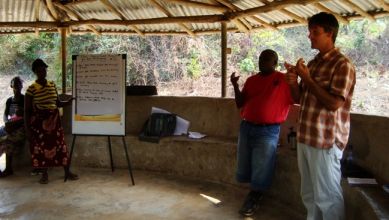Churches Help Farmers Help Themselves, Communities Doing 'Amazing' Work

A Presbyterian Church (U.S.A.) ministry coordinator says a project involving several U.S.-based denominations to help West African farmers help themselves through training over the past several years has resulted in communities that are doing 'amazing' work, and says she hopes the program can continue to expand in a pair of nations trying to put wars behind them.
"Some of the community projects are doing amazing work," Cynthia White, coordinator for the Presbyterian Mission Agency's Self Development of People ministry told Presbyterian News Service in a recently published interview. "I was there three years ago and on this recent trip I saw the difference in the health of the children. Some of the communities were cleaner. You saw that people had pride in their country."
The PCUSA is leading a partnership which includes the United Methodist Committee on Relief (UMCOR), the United Church of Christ, the Disciples of Christ, and ecumenical partners in Liberia and Sierra Leone.
The project is called the West Africa Initiative and White says it was launched to strengthen the capacity of rural community groups to develop self-reliant food production.
She says the method to be used was to provide training for facilitators and for them return to their communities to provide training for other community groups to change their communities.
The "really practical training," she says, involves teachings on sustainable agriculture, bookkeeping and how to run a meeting.
White said a highlight of a recent trip to the countries involved the health development of children.
"My highlight in Sierra Leone was seeing a set of twins that I saw three years earlier and how unhealthy they looked three years ago and how healthy they are now," she said. "A highlight in Liberia was walking to the farm with the community people and seeing how proud they are and seeing the far which is about 10 acres of cassava.
She said the majority of the projects involve farming, with most people growing cassava, groundnuts and rice and that they are now also beginning to cultivate moringa, a medicinal tree. Others do beekeeping for honey.
She also explained her hopes for the project.
"In Liberia the hope is that WAI will spread to more communities, particularly in the south, and for both countries that they will grow sufficient food to feed themselves, their families and communities and that the groups will create economic development projects that will keep them going."
White says the West Africa Initiative complies with funding criteria established by her ministry.
"Consistent with those criteria, the project must come from a community group and be clearly owned and controlled by community people," she said.
Theological Introduction
The Presbyterian Church (U.S.A.) website describing the church's Self-development of People ministry notes that members of the church "have traditionally valued self-determination."
"It is a concept deeply rooted in the Christian Church's philosophy and in the pioneering spirit of the United States," the website notes.
Through the program, the church considers the application of the concept a "crucial element in turning the tables on despair here and abroad. It affirms the concept demonstrated by Christ and His mission. By his actions, Jesus demonstrated His belief in people as children of a loving God. The Presbyterian Church (U.S.A.) continues that mission by exercising the same belief in the practical terms of our own day and age."
"That some of our sisters and brothers are forced to beg for human dignity is absolutely scandalous to the Kingdom to which we have been called to witness. May God provoke us to give our money, our time and our talents to programs of self-development as an evangelical witness to the good news of salvation revealed in Jesus Christ."
The website identifies the biblical and theological foundation for the work, pointing out specific scriptures about concern for the poor, human dignity, justice, solidarity and dignity of work.
It also speaks about the history of the program, the national committee behind the program, how regional parts of the church support it and links to staff.
On the web: